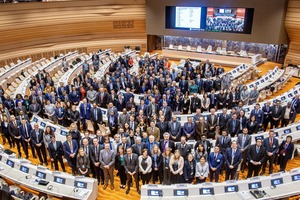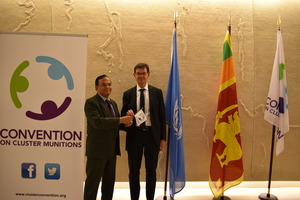
Mr President,
At the outset the delegation of Sri Lanka wishes to congratulate you on your assumption of the first Presidency of the 2021 session of the Conference on Disarmament. Our delegation assures you and other P6 Presidents of its full support and cooperation to find common grounds for fulfilling CD’s obligations towards strengthening international peace and security. We are encouraged by the approach of the six presidencies working together as a team in this regard. We also thank the Secretary General of the CD and the CD Secretariat for their support.
Sri Lanka aligns itself with the statement of G21 delivered by Indonesia.
Mr. President, our delegation notes with appreciation the package proposal presented by you on behalf of the six Presidents. We affirm our full support for your efforts to develop this package through a consultative process and reach consensus on a balanced and comprehensive programme of work with a view to resuming multilateral disarmament negotiations, which we have failed to achieve for far too long.

The Eighteenth Meeting of the States Parties to the Convention on the Prohibition of the Use, Stockpiling, Production and Transfer of Anti-personnel Mines and on Their Destruction
Agenda Item: 7. General exchange of views (continued)
Mr. President,
At the outset I would like to commend the excellent manner in which you lead the work of the Convention and to appreciate your team for facilitating this meeting despite the extraordinary circumstances.
Sri Lanka will be pleased to join the Article 5 Implementation Committee exemplifying Sri Lanka’s strong commitment to advancing as well as contributing to the universal realisation of the salutary objectives of the Convention.
Statements Delivered by Sri Lanka at the Meeting of the Group of Governmental Experts (GCE) on Emerging Technologies in the areas of Lethal Autonomous Weapon Systems (LAWS) held in Geneva on from 21-25 September 2020.
Agenda Item : 5(a) An exploration of the potential challenges posed by emerging technologies in the area of Lethal Autonomous Weapons Systems to International Humanitarian Law;
Mr. Chair,
Excellencies, Distinguished participants,
At the outset, Sri Lanka would like to congratulate you on your assumption of the Chair of the Group of Governmental Experts (GGE) on Emerging Technologies in the Field of Lethal Autonomous Weapons Systems (LAWS). We also take this opportunity to appreciate the former Chair of the GGE on LAWS Ambassador Kārkliņš, for his commitment and efforts to continue the momentum. Let me assure you Mr. Chair, of the support of our delegation to the continuation of substantive deliberations in the GGE on LAWS during this year and in 2021.
It is unfortunate that the unexpected circumstances during this year as well as the difficulty to reach consensus on key aspects of the GGE have led to a lack of substantive progress that many of us would have expected to achieve.

Sri Lanka's Permanent Representative to the UN in Geneva Ambassador A.L.A. Azeez takes over the Chairmanship of the 2020 States Parties' Meeting from Ambassador Yann Hwang of France, the outgoing Chair.
Sri Lanka's chairmanship, as the Convention marks 45 years of its entry into force next year and as the State Parties convene throughout 2020 a series of expert meetings and preparatory meetings building up towards the Ninth Review Conference in 2021, is highly significant for strengthening international cooperation and assistance to fully realise its objectives alongside universalisation and sustained focus on national implementation.
The Convention on the Prohibition of the Development, Production and Stockpiling of Bacteriological (Biological) and Toxin Weapons and on their Destruction, popularly known as Biological Weapons Convention (BWC) prohibits biological and toxin weapons through their entire cycle, and is a key element in the international community’s efforts to address the proliferation of weapons of mass destruction and States Parties’ endeavours to improve national security in an increasingly volatile global environment.
Permanent Mission of Sri Lanka
6th December 2019
Geneva
Convention on Prohibitions or Restrictions on the Use of Certain Conventional Weapons Which May be Deemed to Be Excessively Injurious or to Have Indiscriminate Effects (CCW)
Meeting of High Contracting Parties
General Exchange of Views – 13 November 2019
Statement by Sri Lanka
Mr. President,
It is with great pleasure and warmth that Sri Lanka welcomes you to Geneva and joins in congratulating you on your appointment as the President of this year’s Meeting of High Contracting Parties to the CCW. We commend the leadership provided by Pakistan to the CCW process in the run up to this Meeting, as it did during the CCW Review Conference of 2016 as well. We also take this opportunity to applaud Benin on acceding to Protocols II, IV and V in 2019, further strengthening its commitment to the cause of the CCW.
Mr. President,
As a country successfully emerging from the effects of long-term conflict, Sri Lanka appreciates and underlines the pronounced need for humanitarian disarmament and arms control. Norms of humanity and related principles of international humanitarian law, including proportionality, inform discourses on regulation, control and eventual elimination of weapons that are excessively injurious. Following years of humanitarian demining work that was undertaken even as the conflict was raging, we are now inching closer to making Sri Lanka landmines-free in the near future. Through sustained national efforts at mine risk education, we also succeeded in bringing civilian casualties of landmines, to zero by 2018.

The 9th Meeting of States Parties (MSP) to the Convention on Cluster Munitions (CCM) concluded its deliberations in Geneva on 4 September 2019 under the Presidency of Sri Lanka. States parties, signatories, observer states and international and civil society organizations participated in the three-day meeting which convened its first session on 2 September 2019.
The MSP, chaired by Ambassador A.L.A. Azeez, Sri Lanka’s Permanent Representative to the UN in Geneva, marked the culmination of a year-long process of oversight and review of the implementation of the Convention on Cluster Munitions and of guidance and advocacy for the universalization of the Convention and its norms, and the prohibition of use, production, stockpile and transfer of cluster munitions. Sri Lanka’s election to the Presidency of the 9th MSP had been facilitated by the wide recognition among the international community, of its strengthened commitment to humanitarian disarmament, as manifested by its accession to the CCM and the Anti-Personnel Mine Ban Convention (APMBC) in 2017 and 2018 respectively.
